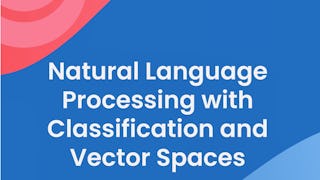This course offers a clear pathway to undertsand advanced tokenization and sentiment analysis—two core pillars of modern NLP. You'll learn how to convert raw text into structured input using subword, character-level, and adaptive tokenization techniques, and how to extract sentiment using rule-based, statistical, and deep learning models.



Advanced Tokenization and Sentiment Analysis
Dieser Kurs ist Teil von Spezialisierung Mastering NLP: Tokenization, Sentiment Analysis & Neural MT

Dozent: Edureka
Bei  enthalten
enthalten
Empfohlene Erfahrung
Was Sie lernen werden
Build smarter NLP pipelines with advanced tokenization methods like byte-pair encoding, subword units, and streaming-friendly strategies.
Create powerful text representations using character-level, hybrid, and sentence embeddings for real-world search, classification, and clustering.
Learn sentiment analysis with VADER, machine learning models, and transformer-based approaches like BERT and RoBERTa.
Analyze opinion trends, perform aspect-level and multilingual sentiment analysis, and ensure fairness and accuracy in sensitive applications.
Kompetenzen, die Sie erwerben
- Kategorie: Data Cleansing
- Kategorie: Unified Modeling Language
- Kategorie: Data Ethics
- Kategorie: Unstructured Data
- Kategorie: Data Processing
- Kategorie: Natural Language Processing
- Kategorie: Text Mining
- Kategorie: Artificial Intelligence and Machine Learning (AI/ML)
- Kategorie: Machine Learning Algorithms
- Kategorie: Time Series Analysis and Forecasting
- Kategorie: Machine Learning
- Kategorie: Applied Machine Learning
- Kategorie: Large Language Modeling
- Kategorie: Deep Learning
- Kategorie: Data Analysis
Wichtige Details

Zu Ihrem LinkedIn-Profil hinzufügen
Juli 2025
16 Aufgaben
Erfahren Sie, wie Mitarbeiter führender Unternehmen gefragte Kompetenzen erwerben.

Erweitern Sie Ihre Fachkenntnisse
- Lernen Sie neue Konzepte von Branchenexperten
- Gewinnen Sie ein Grundverständnis bestimmter Themen oder Tools
- Erwerben Sie berufsrelevante Kompetenzen durch praktische Projekte
- Erwerben Sie ein Berufszertifikat zur Vorlage

In diesem Kurs gibt es 4 Module
In this module, learners will explore advanced techniques for breaking down and encoding text for machine understanding. They will examine subword, byte-level, and adaptive tokenization methods used in modern NLP models. The module also introduces character-level and hybrid embeddings, as well as sentence embeddings for capturing semantic meaning in tasks like search, classification, and clustering.
Das ist alles enthalten
19 Videos6 Lektüren5 Aufgaben1 Diskussionsthema2 Plug-ins
In this module, learners will explore the full range of approaches used to analyze sentiment in text, from rule-based lexicons to deep learning with transformer models. They will examine how sentiment is extracted, scored, and classified, and learn how to handle challenges like class imbalance, domain specificity, and low-resource settings. Practical demonstrations will help reinforce the application of models such as VADER, Naïve Bayes, BERT, and RoBERTa in real-world sentiment analysis tasks.
Das ist alles enthalten
16 Videos5 Lektüren4 Aufgaben1 Plug-in
In this module, learners will examine how sentiment analysis is applied in dynamic, multilingual, and high-impact environments. The lessons focus on tracking sentiment trends over time, extracting aspect-level opinions, and extending sentiment models across languages. Learners will also evaluate the ethical risks of sentiment modeling and explore how to design fair, accountable systems for sensitive applications like healthcare and justice.
Das ist alles enthalten
19 Videos6 Lektüren5 Aufgaben
In this final module, learners will consolidate key concepts from the course through a structured summary, a real-world project, and a reflective assignment. The focus is on applying the full range of tokenization and sentiment analysis techniques in practical, domain-relevant scenarios. This module also encourages learners to evaluate their understanding and prepare for real-world NLP tasks by integrating technical knowledge with ethical and contextual awareness.
Das ist alles enthalten
1 Video1 Lektüre2 Aufgaben1 Diskussionsthema1 Unbewertetes Labor1 Plug-in
Erwerben Sie ein Karrierezertifikat.
Fügen Sie dieses Zeugnis Ihrem LinkedIn-Profil, Lebenslauf oder CV hinzu. Teilen Sie sie in Social Media und in Ihrer Leistungsbeurteilung.
Mehr von Machine Learning entdecken
 Status: Kostenloser Testzeitraum
Status: Kostenloser Testzeitraum
Coursera Project Network
 Status: Kostenloser Testzeitraum
Status: Kostenloser Testzeitraum Status: Kostenloser Testzeitraum
Status: Kostenloser TestzeitraumEdureka
Warum entscheiden sich Menschen für Coursera für ihre Karriere?





Neue Karrieremöglichkeiten mit Coursera Plus
Unbegrenzter Zugang zu 10,000+ Weltklasse-Kursen, praktischen Projekten und berufsqualifizierenden Zertifikatsprogrammen - alles in Ihrem Abonnement enthalten
Bringen Sie Ihre Karriere mit einem Online-Abschluss voran.
Erwerben Sie einen Abschluss von erstklassigen Universitäten – 100 % online
Schließen Sie sich mehr als 3.400 Unternehmen in aller Welt an, die sich für Coursera for Business entschieden haben.
Schulen Sie Ihre Mitarbeiter*innen, um sich in der digitalen Wirtschaft zu behaupten.
Häufig gestellte Fragen
This course provides a deep dive into modern tokenization strategies and sentiment analysis techniques used in multilingual and domain-specific NLP tasks. It explores subword modeling methods like Byte-Pair Encoding (BPE), WordPiece, and SentencePiece, and examines character-level encoding approaches. Learners work with cross-lingual embeddings such as MUSE and LASER, and fine-tune models like mBERT and XLM-R for sentiment classification. The course also covers Aspect-Based Sentiment Analysis (ABSA), lexicon-based methods using VADER and SentiWordNet, and applies these techniques to real-world use cases like social media monitoring, political discourse analysis, and crisis event sentiment tracking.
Learners explore modern tokenization strategies, including Byte-Pair Encoding (BPE), WordPiece, SentencePiece, and character-level encoding, all crucial for subword-level text representation.
Yes. The course emphasizes multilingual and cross-lingual sentiment analysis, using shared subword vocabularies and models like mBERT and XLM-R to handle multiple languages effectively.
Weitere Fragen
Finanzielle Unterstützung verfügbar,

